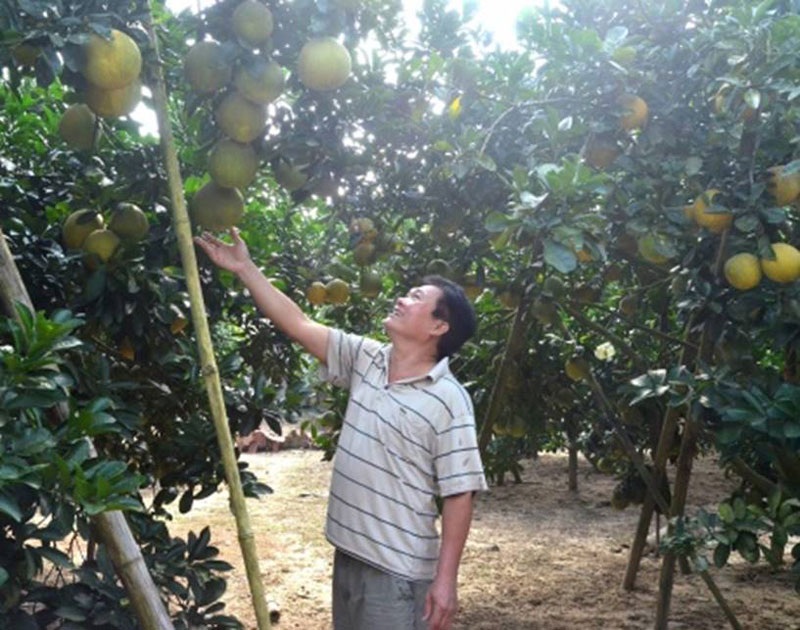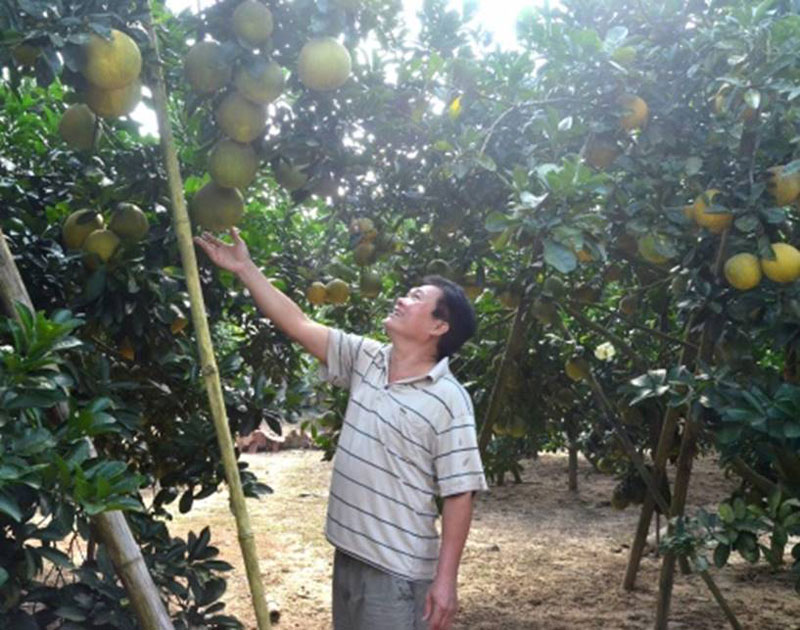
(HBO) - In December, Tan Lac district began harvesting grapefruits - the most well-known local specialty.

Photo:
In order to ensure productivity, VietGAP-standard grapefruit orchard brings revenue
of over 200 million VND to Bui Van Vinh family in Dong Tien village, Dong Lai
commune, Tan Lac district.
This year, nearly 100 grapefruit trees of Bui
Van Vinh, a farmer in Dong Tien village, Dong Lai commune, Tan Lac district, yielded
well again. The most fruitful tree bears over 500 fruits while the rest has 300
fruits per tree on average. All grapefruit trees are cultivated under VietGAP
standards so that their output, quality and consumption are also ensured,
bringing a stable income to his family.
like Vinh’s family, the family of hamlet chief
Luong Ba Cuong is excited to enter the grapefruit harvest season. Cuong said the
village is home to 70 houses which all grow grapefruit trees on a total area of
over 20ha. His family and 22 others join the Dong Lai clean farm produce
cooperative with 10ha of grapefruits grown under VietGAP standards. Though newly
established since early 2017, the cooperative has so far achieved remarkable
results. Up to 53 cooperative members are realising a plan to bring Tan Lac red-flesh
grapefruits to the market. To do that, all fruits must meet high quality
standards, particularly 30ha of grapefruits which have achieved VietGAP quality
standards.
At present, Tan Lac district boasts 52ha of
VietGAP-certified grapefruits in Dong Lai, Thanh Hoi and Tu Ne communes. Its total
grapefruit farming area has soared from nearly 110ha in 2013 to about 1,046ha,
mostly in low-lying communes.
Around 395ha of Tan Lac grapefruits are ready
for harvest now. Each ha of red-flesh grapefruits yields 35,000 fruits on
average, equivalent to 30 tonnes per ha at the price of nearly 15,000 VND per
fruit, bringing an average income of 525 million VND per ha per crop. For green
skin grapefruits, the average yield is 15,000 fruits per ha, or 20 tonnes per
ha at the price of roughly 30,000 VND per kg, bringing an average income of 600
million VND per ha per crop.
With high economic value during the crop,
grapefruits promise to bring high incomes to hundreds of local households./.
According to data from the Hoa Binh Provincial Party Committee, the industrial production index for the first six months of 2025 is estimated to have increased by 20% compared to the same period last year. This marks the highest year-on-year growth rate for this period since 2020.
In the first six months of 2025, Hoa Binh province’s export turnover was estimated at 1.145 billion USD, marking an 18.11% increase compared to the same period in 2024. Import turnover was estimated at $ 804 million, a 17.15% increase, which helped the province maintain a positive trade balance.
The lives of the ethnic minority farmers in Tan Lac district have gradually improved thanks to the new directions in agricultural production. This is a testament to the collective strength fostered through the professional associations and groups implemented by various levels of the district’s Farmers’ Union.
With the motto the "product quality comes first,” after nearly one year of establishment and operation, Muong village’s Clean Food Agricultural and Commercial Cooperative, located in Cau Hamlet, Hung Son Commune (Kim Boi district), has launched reputable, high-quality agricultural products to the market that are well-received by consumers. The products such as Muong village’s pork sausage, salt-cured chicken, and salt-cured pork hocks have gradually carved out a place in the market and they are on the path to obtaining the OCOP certification.
In the past, the phrase "bumper harvest, rock-bottom prices" was a familiar refrain for Vietnamese farmers engaged in fragmented, small-scale agriculture. But today, a new spirit is emerging across rural areas of Hoa Binh province - one of collaboration, organisation, and collective economic models that provide a stable foundation for production.
Maintaining growing area codes and packing facility codes in accordance with regulations is a mandatory requirement for agricultural products to be eligible for export. Recently, the Department of Agriculture and Environment of Hoa Binh province has intensified technical supervision of designated farming areas and packing facilities to safeguard the "green passport" that enables its products to access international markets.



